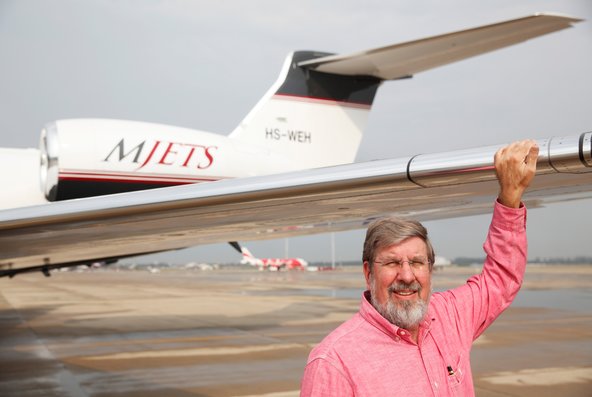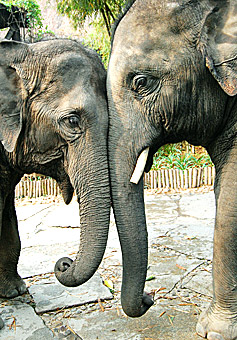Asia's Extraordinaire ex-Pat
American Bill Heinecke became a self-made millionaire as a teen in Thailand, where he is now a billionaire and one of the region's most driven entrepreneurs. His business run from retail and restaurants to the fast-growing Anantara resort chain. Now he's expanding to Australia, the Middle East and Africa - and still having a blast.
By Ron Gluckman / Bangkok,Thailand
F
ROM HIS ASIAN BASE, WILLIAM HEINECKE is expanding into Africa, the Middle East and Australia. “It’s a more complex world,” says the amazing expat American businessman who has become a billionaire entrepreneur in Asia “But the skills of being an entrepreneur haven’t changed, and probably won’t change.”Thailand's William Ellwood Heinecke has always followed his instincts.
He started his first businesses, cleaning offices and selling advertising, as an expatriate high school student in Bangkok. He was a millionaire before he reached voting age.
 Defying conventional wisdom at the time about overseas appetites, he
introduced pizza to Asians in the early 1980s, the start of an empire of
retailers, restaurants and resorts built around classic brands like Pizza Hut,
Sizzler, Marriott and Esprit. It encompasses more than 10,000 rooms and 1,400
restaurants across 22 countries. He has moved up the value chain, developing his
own successful brands.
Defying conventional wisdom at the time about overseas appetites, he
introduced pizza to Asians in the early 1980s, the start of an empire of
retailers, restaurants and resorts built around classic brands like Pizza Hut,
Sizzler, Marriott and Esprit. It encompasses more than 10,000 rooms and 1,400
restaurants across 22 countries. He has moved up the value chain, developing his
own successful brands.
Now Mr. Heinecke, the billionaire chairman of Minor International, has aggressively steered expansion into the Middle East, Africa, Australia and emerging markets across Asia, flying around the region in corporate jets (which he also owns, and leases), swooping in on huge deals.
Maintaining the spirit of American entrepreneurship, Mr. Heinecke has kept his mantra the same: find a gap and fill it.
“The stakes are bigger perhaps,” he said. “Now we’re dealing with a bigger playing field. It’s a more complex world. But the skills of being an entrepreneur haven’t changed, and probably won’t change.”
Mr. Heinecke has long stood out as an entrepreneur here, and not just because of his unusual upbringing and appearance — he is six feet tall and has worn a beard since he started his first businesses as a teenager.
Asia is among the world’s biggest source of new billionaires, but most expand or refocus family wealth. Outside of mushrooming markets like technology and real estate, few are self-made successes like Mr. Heinecke.
Fewer still are Western-born. “You can probably put him among a handful of expats in Asia,” says Kevin Whitcraft, another American businessman raised in Thailand, who has franchised one of Mr. Heinecke’s companies in frontier markets like Laos and Cambodia.
“What really stands out about Bill is that he could have made it anywhere in the world,” Mr. Whitcraft added. “He’s always been a great salesman. He’s just a born businessman and entrepreneur.”
Mr. Heinecke, 64, grew up in Hong Kong, Japan and Thailand. His father, Roy, was a United States diplomat in Asia. His mother, Constance, worked for American magazines. The family moved to Bangkok 50 years ago.
He always seemed in a hurry. Starting with go-carts as a boy, he geared up to the racetrack, then rallies on dirt roads through the jungles. He set many Asian records, and survived several near-fatal crashes. He keeps a collection of vintage cars including a 1963 Shelby Cobra worth $3 million, and a Ferrari that once belonged to Clint Eastwood.
He says he believes he was in the right place at the right time, before the Asian boom. Yet he was not only driven, he had an innate sense of direction. As fellow students traveled West to attend college, Mr. Heinecke stayed in Thailand. “I always knew what I wanted to do, and where to do it. I just saw so much opportunity here,” he explained.
In 1980, he introduced pizza to Asians. Experts predicted that they would never take to Western fare, but he added local ingredients and quickly became Asia’s pizza king. He initially franchised for Pizza Hut, but when the parent company tried to restrict his other restaurant efforts, a battle ensued, and Mr. Heinecke boldly started his own Pizza Company, instantly becoming the regional giant.
He spied a related opportunity and moved into dairy production, churning out cheese to top all those pies. He melts 1,000 tons of mozzarella annually, just in his Thailand pizza parlors.
Mr. Heinecke expanded into hotels, running properties under the Marriott, Sheraton and Four Seasons banners. His hotels typically feature an array of retail shops and dining, mainly from the Minor portfolio. Call it old-fashioned synergy.
 Some point to construction of the Four
Seasons Tented Camp in the Golden Triangle, where Thailand borders Laos and
Myanmar, as a transformational project in Mr. Heinecke’s career. Jason Friedman
worked closely with Mr. Heinecke a decade ago on the small collection of luxury
tents in an elephant sanctuary financed by Mr. Heinecke. Many thought it a
vanity project — contrasting Mr. Heinecke’s reputation for frugality.
Some point to construction of the Four
Seasons Tented Camp in the Golden Triangle, where Thailand borders Laos and
Myanmar, as a transformational project in Mr. Heinecke’s career. Jason Friedman
worked closely with Mr. Heinecke a decade ago on the small collection of luxury
tents in an elephant sanctuary financed by Mr. Heinecke. Many thought it a
vanity project — contrasting Mr. Heinecke’s reputation for frugality.
“Bill is quite well known for being conservative, almost formulaic, by the numbers,” said Mr. Friedman, former manager at the camp, but now the manager of the Siam, an upscale boutique lodge in Bangkok. “The tented camp was really a passion for him. He was involved in all the details, right down to the number of animals in the park.
“I saw a very different side of Bill than many see, and the project really put him out there not only as an entrepreneur but also an innovator.”
The camp became a global sensation, generating more publicity than any previous Four Seasons opening, he said. Minor later started Anantara, which has become one of the fastest-growing Asia-based resort chains. Much of that growth has been in the Middle East, China and the Maldives.
“Now, we are recognized for our expertise, our own intellectual property,” Mr. Heinecke said. Anantara is like a franchiser. Owners finance the projects and pay Minor management fees. “This allows us to grow the brand much faster.” Revenue for the company’s hotel division was up 80 percent in 2012 over the previous year.
Mr. Heinecke has also expanded Minor by canny acquisition. His takeover of Oaks Hotels and Resorts in Australia doubled hospitality operations in 2011. While he had ample success with his own Pizza Company, he bought Australia’s Coffee Club to take prominence in another market many said would never gain traction in Asia.
Minor is now ideally positioned just as coffee consumption soars across the increasingly affluent region.
Yet there have been missteps, as Mr. Heinecke is the first to recount. “You don’t succeed without stumbling,” he said.
Mr. Heinecke was probably the first to bring fast food to China — too early, as it turned out. He was also a pioneer with hotels in Vietnam, building in the 1980s, before the boom. That first hotel in Vietnam, he conceded, still has not turned a profit. Several other properties in Vietnam are doing well, however. He chalked that up to lessons learned and diligence, something he stresses in every aspect of his operation. Before he signed on the Oaks deal, he said, he visited most of the hotels, staying in many.
Outside forces have also buffeted his operations. Mr. Heinecke was nearly crushed by the Asian financial crisis in the late 1990s. The 2004 tsunami wiped out an entire hotel. Coups, flooding and SARS have also hit his businesses hard, particularly those heavily dependent on tourism.
Through it all, Mr. Heinecke remains focused on the next deal, and improving efficiency. “He’s constantly on the move, doing business all the time,” said Joe Cummings, a Bangkok author who is writing a book about the Anantara hotels and destinations. “He’s like a shark, very opportunistic. And he really knows every detail about his businesses, right down to the price of a candy bar in the minibar.”
Ron Gluckman is an American reporter who has been roaming around Asia since 1991, for various publications, including the New York Times, which ran this story on July 4, 2013
Heinecke photo from the New York Times, Elephant by Ron Gluckman
All words copyright RON GLUCKMAN
To return to the opening page and index
push here
[right.htm]
